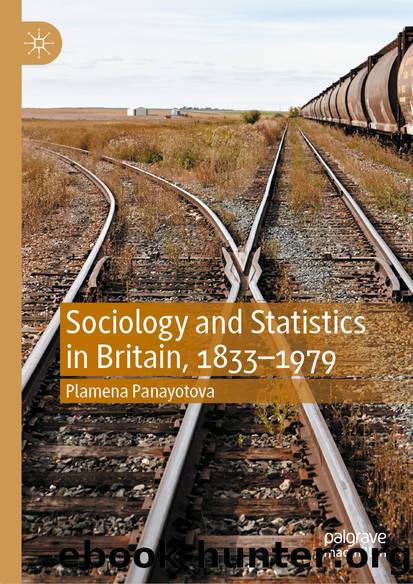Sociology and Statistics in Britain, 1833â1979 by Plamena Panayotova

Author:Plamena Panayotova
Language: eng
Format: epub
ISBN: 9783030551339
Publisher: Springer International Publishing
Barbara Wootton
T. H. Marshallâs 1946 lecture on âSociology at the Crossroadsâ was first delivered as an inaugural address when Marshall became a professor in Social Institutions at the LSE in 1944. Competing against him for the post was Barbara Wootton (1897â1988), an economist by training, who, by the mid-1940s, had widened her academic interests to include the broader spectrum of social science. In her biography of Wootton, Ann Oakley describes in detail the 1944 competition for the LSE professorship, concluding that âHad Barbara got the LSE post, the future of sociology at the LSE might have been quite different [â¦]â (Oakley 2011: 190). This is not an unreasonable suggestion, given that Marshall and Wootton differed significantly in their social scientific outlook even though neither of them held extreme views about what was the ârightâ path for social science. As Oakley puts it, Marshall was âthe man with a theoretical dispositionâ, while Wootton was âthe woman whose mind turned on the empirical usefulness of the social sciencesâ (Oakley 2011: 189) after she became disillusioned with economics.
Wootton remembered that at the time she graduated in 1919, almost all of academic work in economics was of deductive, rather than inductive character and that her degree had left her unfamiliar with the simplest techniques of social empirical investigation (Wootton 1967: 210â211). Over the years, her dissatisfaction with economics grew even strongerâin 1938, she published Lament for Economics, which marked the end of her career as an economist and âthe beginning of her identification with the ranks of those who had come from the cold [of economics] to the relative warmth of sociologyâ (Oakley 2011: 166).
What people expected from the burgeoning social sciences in the early post-war period were some new, fresh and potent alternatives for the solution of humankindâs problems. In her book Testament for Social Science (1950), Wootton argued, in a similar vein to Beveridge whom I cited earlier, that the most effective way to achieve this was to employ the scientific method in the study of humanityâs most pressing social problems:It is no less obvious that this method, which has been so brilliantly successful in the natural sciences, is not normally applied to the field of our most disastrous failures. [â¦] we ought seriously to ask whether the tool that has worked such wonders in the one job could not be used for the other. (Wootton 1950: 1â2)
Download
This site does not store any files on its server. We only index and link to content provided by other sites. Please contact the content providers to delete copyright contents if any and email us, we'll remove relevant links or contents immediately.
| Anthropology | Archaeology |
| Philosophy | Politics & Government |
| Social Sciences | Sociology |
| Women's Studies |
Nudge - Improving Decisions about Health, Wealth, and Happiness by Thaler Sunstein(7689)
The Fire Next Time by James Baldwin(5429)
iGen by Jean M. Twenge(5408)
Adulting by Kelly Williams Brown(4564)
The Sports Rules Book by Human Kinetics(4378)
The Hacking of the American Mind by Robert H. Lustig(4375)
The Ethical Slut by Janet W. Hardy(4241)
Captivate by Vanessa Van Edwards(3837)
Mummy Knew by Lisa James(3686)
In a Sunburned Country by Bill Bryson(3536)
The Worm at the Core by Sheldon Solomon(3484)
Ants Among Elephants by Sujatha Gidla(3459)
The 48 laws of power by Robert Greene & Joost Elffers(3236)
Suicide: A Study in Sociology by Emile Durkheim(3017)
The Slow Fix: Solve Problems, Work Smarter, and Live Better In a World Addicted to Speed by Carl Honore(3001)
The Tipping Point by Malcolm Gladwell(2910)
Humans of New York by Brandon Stanton(2864)
Handbook of Forensic Sociology and Psychology by Stephen J. Morewitz & Mark L. Goldstein(2692)
The Happy Hooker by Xaviera Hollander(2686)
